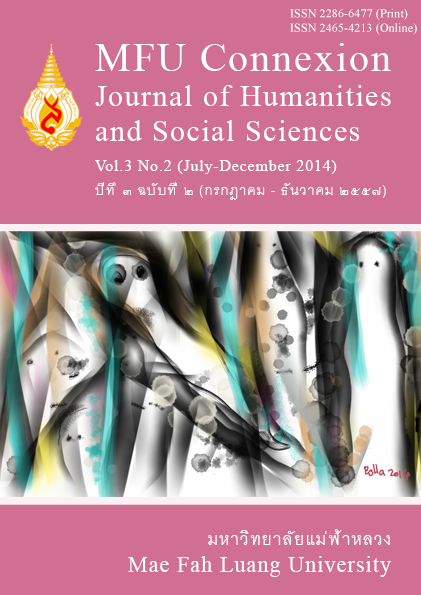อำนาจเพิกถอนมติการเป็นคดีพิเศษของคณะกรรมการคดีพิเศษตามมาตรา 21 วรรคหนึ่ง (2) แห่งพระราชบัญญัติการสอบสวน คดีพิเศษ พ.ศ. 2547
Main Article Content
Abstract
The study of power to revoke the resolution of board of special case under article 21, paragraph one (2) of Special Case Investigation Act B.E. 2547 (2004) has proposes to discover their organization and authority relate to Board of Special Case (BSC). Moreover, this study was exploring problems and obstacles including analyze the problem of revoke the resolution of a special case under Special Case Investigation Act B.E. 2547 (2004). This is a qualitative research. It collects related data to the use of board of special case’s power from analyzed documents, textbooks, law code, journal of law (Thai and international), minutes, legal seminar, reviews from lawyer, relating researches, relating thesis, and involve regulations.
From the study found that the Special Case Investigation Act B.E. 2547 (2004) empowers to Department of Special Investigation (DSI) have the authority to investigate offenses, which has the important impact to economic, political, and interest of nation. Therefore, a committee called “Board of Special Case (BSC)” is legislated. Under the special Case Investigation Act B.E. 2547 (2004) article 10, specifies board of special case’s authority. For example, recommendation the minister to issue ministerial regulations by article 21 paragraph one. In additional, they follows up the result of performance, or decree the offense under article 21paragraph one (1). It is covering they have the authority to adopt resolutions regarding to other criminal offenses as a special case under article 21 paragraph one (2). Hence, those offenses have to investigate as a special case. Meanwhile, article 10 not legislates to authorize BSC could revoke the special case considered by virtue of article 10 constitute article 21 paragraph (2). Then, those special cases have to continue investigate as a special case. Although, the offenses not according to a special case. Consequently, some criminal cases that taken as a special case in the power of Department of Special Investigation (DSI) has still to be investigated as a special case. This is s affecting the rights and liberties to the accused. Because of the special case’s investigate method has many affect measures on the rights and liberties to people. It caused too many cases in the hand of Department of Special Investigation. Additions, it also caused a delay on a serious case. Moreover, it affected to DSI’s efficiency in order to prevent and suppress crime according to its objective of establishing the Department of Special Investigation.
Thus, it is properly to resolve those problems with empowers board of special case to revoke the resolution committee under article 21, paragraph one (2) of Special Case Investigation Act B.E. 2547 (2004). By virtue of Special Case Investigation Act B.E. 2547 (2004), legislates board of special case to have authority to revoke the resolution committee under article 21, paragraph one (2). This is to avoid the affect that might impact to the rights and liberties of the accused to be investigated fairly and properly. Furthermore, it decreases the amount of special cases and increase efficiency in conducting investigations, and to achieve balance of investigation crime.
Article Details
Copyright
Connexion: Journal of Humanities and Social Sciences has an exclusive right to publish the accepted articles in any form. However, the author retains the following rights:
1. The right to the ownership of the article;
2. The right to use all or part of the article in his/her other works;
3. The right to re-produce the article for personal use or for use in the author’s organisation, in which case the author must obtain permission from Connexion: Journal of Humanities and Social Sciences;
4. The right to make copies of all or part of the work for educational use or for the author’s use in classroom teaching; and
5. The right to include the work (both the preprinted and printed versions) in an institutional repository.
References
พระราชบัญญัติการสอบสวนคดีพิเศษ (ฉบับที่ 2) พ.ศ. 2551. (2551, 20 กุมภาพันธ์) ราชกิจจานุเบกษา, เล่ม 125, ตอนที่ 36 ก, น.23-27.
สุข เปรุนาวิน. (ม.ป.ป.) ระบอบอัยการในต่างประเทศ: ในระบอบอัยการสากล, กรุงเทพฯ: เรือนแก้วการพิมพ์.
ธาริต เพ็งดิษฐ์. (2553) แนวทางการสืบสวนสอบสวนคดีพิเศษ: เอกสารประกอบการสอนชั้นปริญญาโท หลักสูตรนิติศาตรมหาบัณฑิต, เชียงราย: มหาวิทยาลัยวิทยาลัยแม่ฟ้าหลวง.
ประเสริฐ เสียงสุทธิวงศ์ (บก.) (2554) รวมคำบรรยาย ภาคสอง สมัยที่ 64 ปีการศึกษา 2554 (เล่ม 8), กรุงเทพฯ: สำนักอบรมศึกษากฎหมายแห่งเนติบัณฑิตยสภา.
สำนักงานคณะกรรมการกฤษฎีกา. (2548) หารือปัญหาข้อกฎหมายเกี่ยวกับการดำเนินการตามพระราชบัญญัติการสอบสวนคดีพิเศษ พ.ศ. 2547 เรื่องเสร็จที่ 101/2548, กรุงเทพฯ: สำนักงานฯ.
ระเบียบสำนักงานอัยการสูงสุด ว่าด้วยการสั่งคดีอาญาที่จะไม่เป็นประโยชน์ต่อสาธารณชน หรือจะมีผลกระทบต่อความปลอดภัยหรือความมั่นคงของชาติ หรือต่อผลประโยชน์อันสำคัญของประเทศ พ.ศ. 2554. (2554, 29 เมษายน) ราชกิจจานุเบกษา, เล่ม 128, ตอนที่ 30 ก, น.19-21.
พระราชบัญญัติการสอบสวนคดีพิเศษ พ.ศ. 2547. (2547, 19 มกราคม) ราชกิจจานุเบกษา, เล่ม 121, ตอนที่ 8 ก, น.1-16.
ประมวลกฎหมายวิธีพิจารณาความอาญา พ.ศ. 2477. (2478, 10 มิถุนายน) ราชกิจจานุเบกษา, เล่ม 52, น.598-2478.
พระราชบัญญัติปรับปรุงกระทรวง ทบวง กรม พ.ศ. 2545. (2545, 2 ตุลาคม) ราชกิจจานุเบกษา, เล่ม 119, ตอนที่ 99 ก, น.14-34.
พระราชบัญญัติองค์กรอัยการและพนักงานอัยการ พ.ศ. 2553. (2553, 7 ธันวาคม) ราชกิจจานุเบกษา, เล่ม127, ตอนที่ 75 ก, น.38-50.


